【名师面对面】2015中考精英英语(外研版)总复习课件:第12讲 八年级下册 Modules 1~2(共35张PPT)
文档属性
| 名称 | 【名师面对面】2015中考精英英语(外研版)总复习课件:第12讲 八年级下册 Modules 1~2(共35张PPT) | 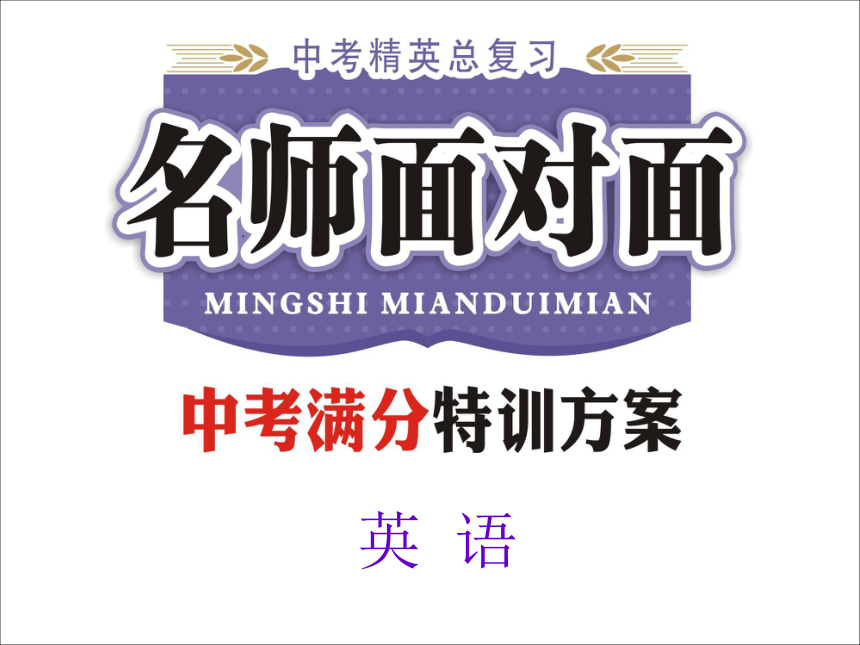 | |
| 格式 | zip | ||
| 文件大小 | 809.0KB | ||
| 资源类型 | 教案 | ||
| 版本资源 | 外研版 | ||
| 科目 | 英语 | ||
| 更新时间 | 2014-12-19 19:15:28 | ||
图片预览

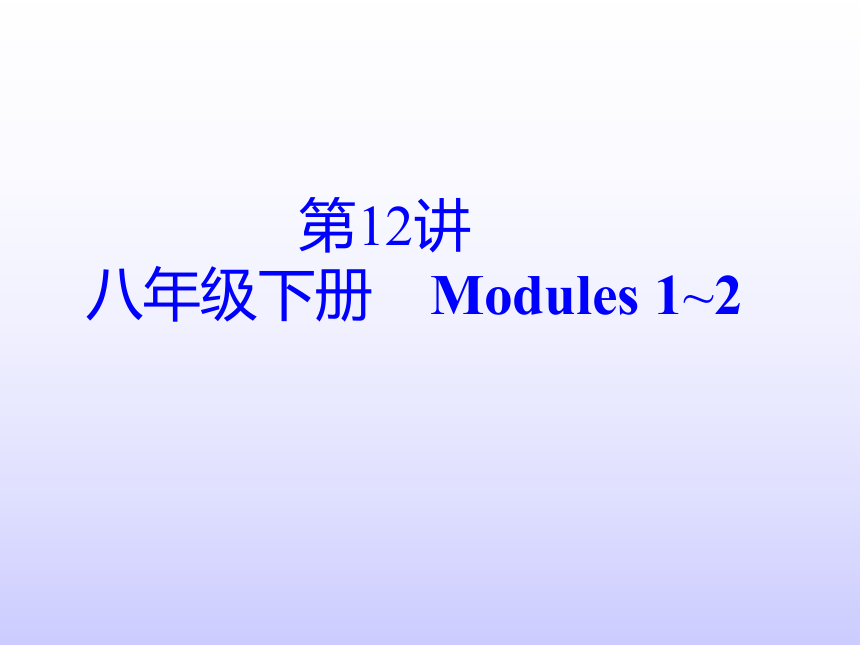
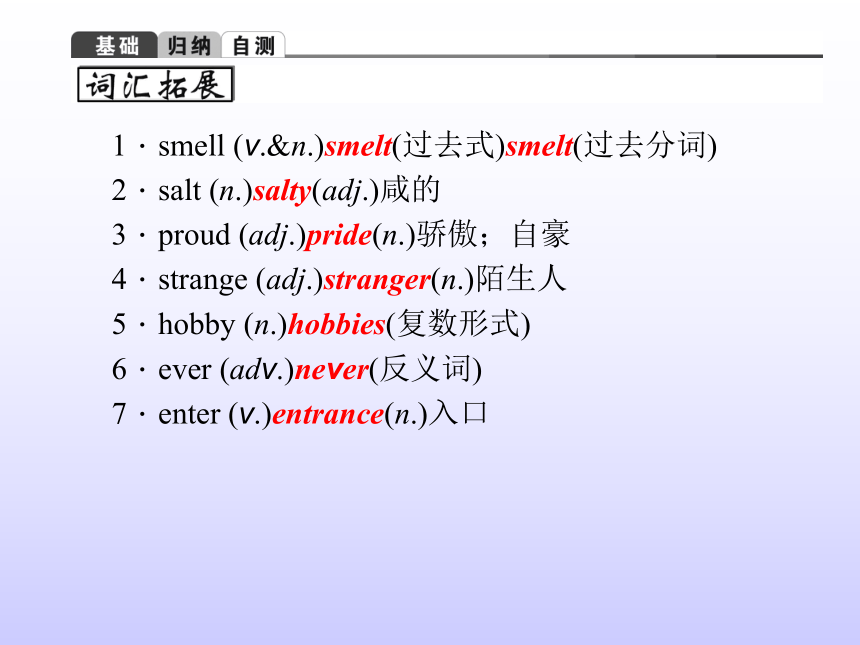
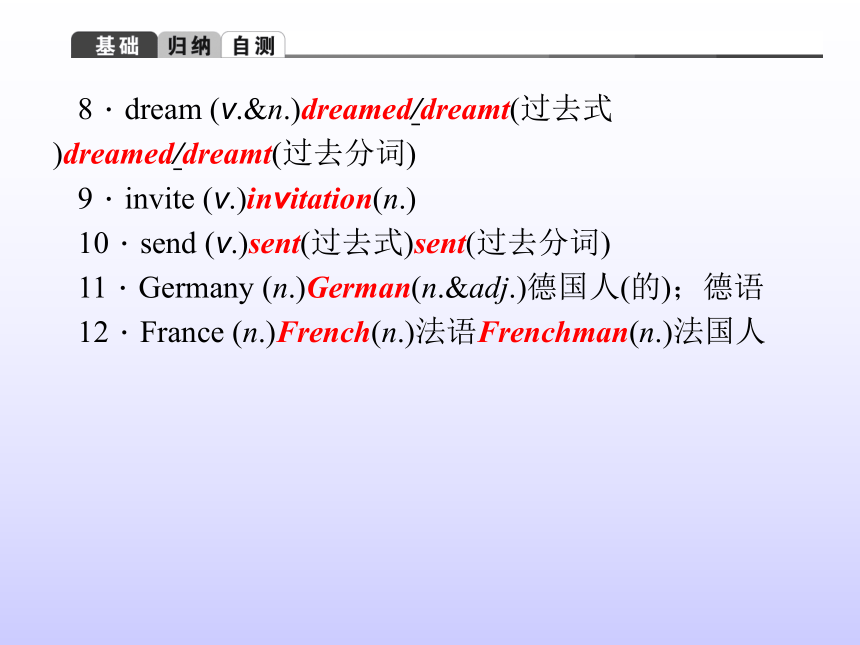
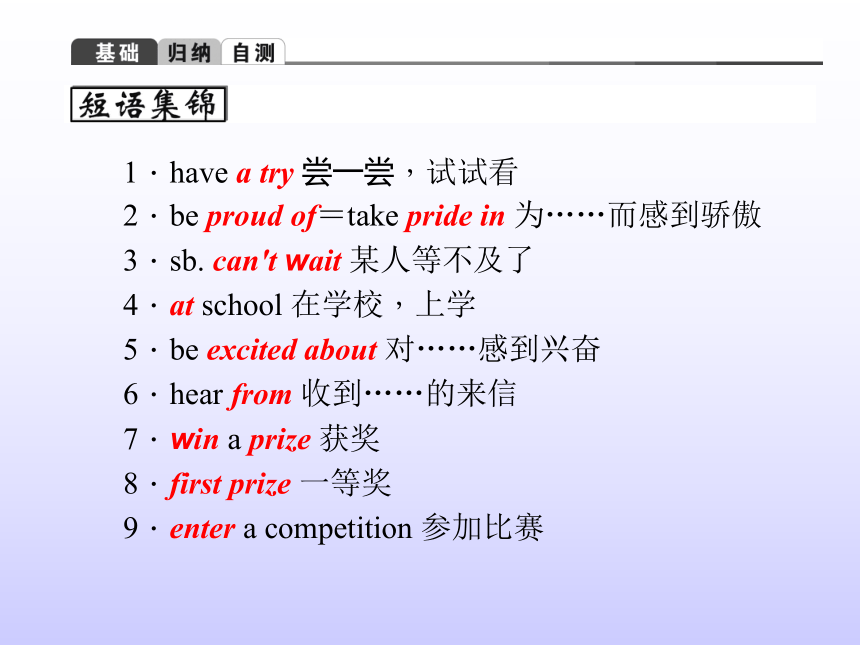
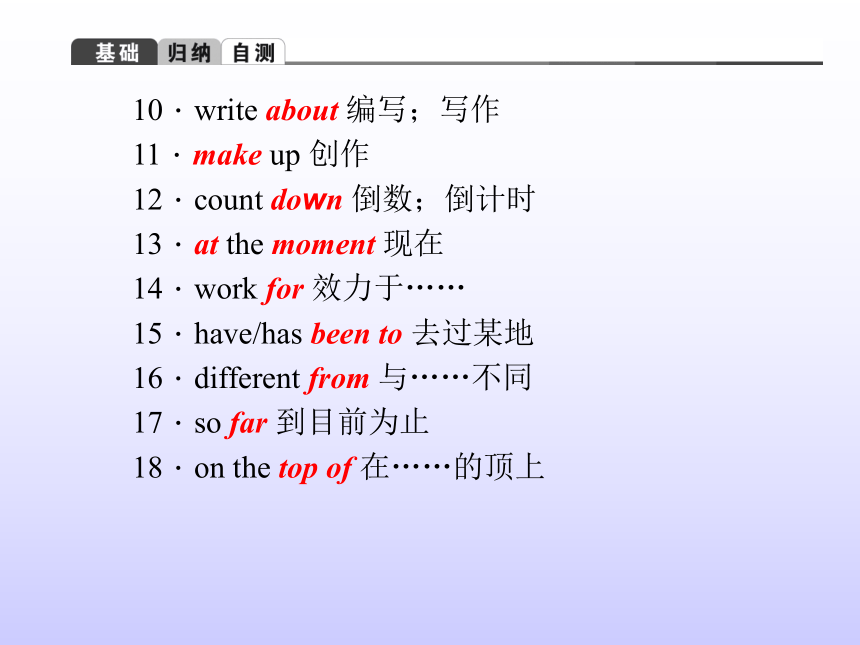
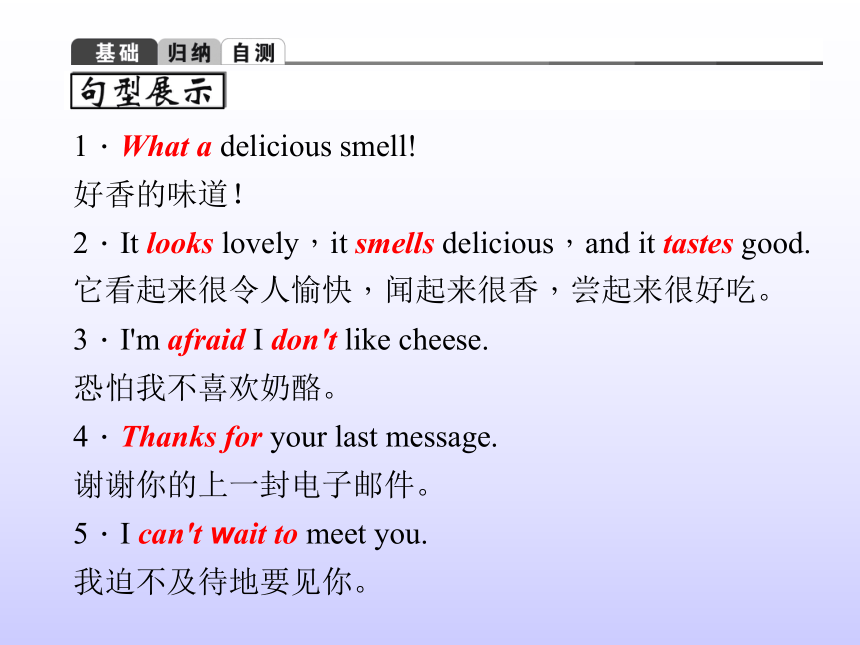
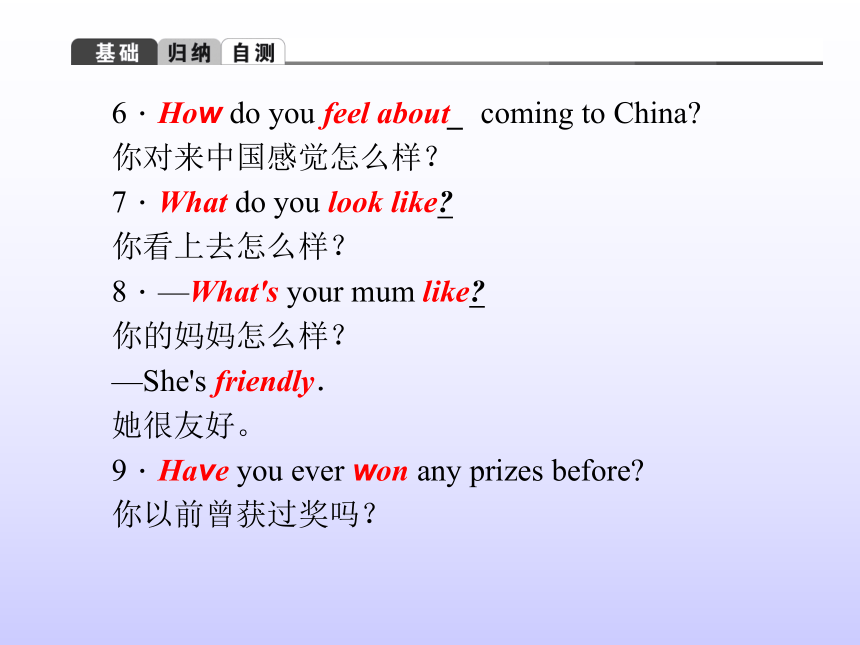
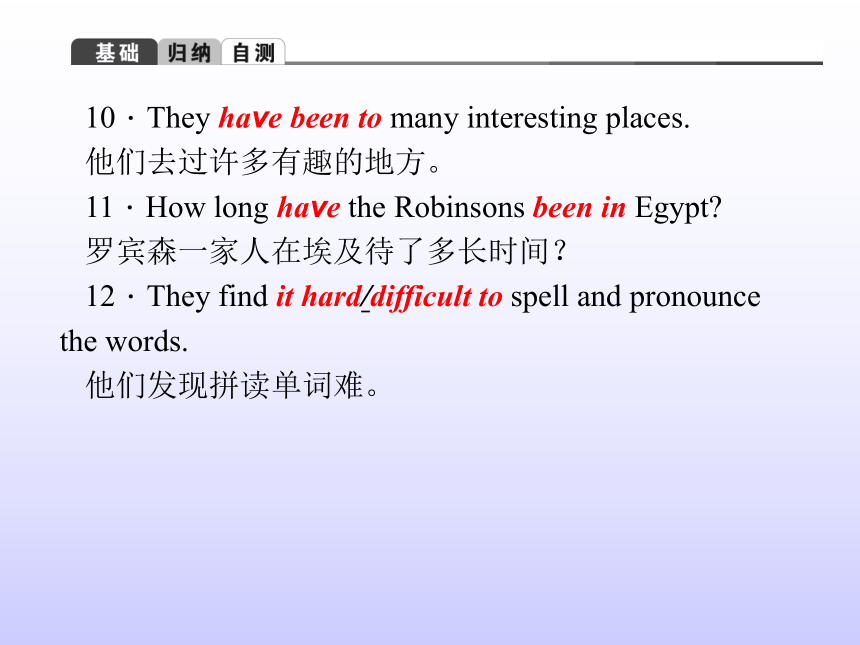
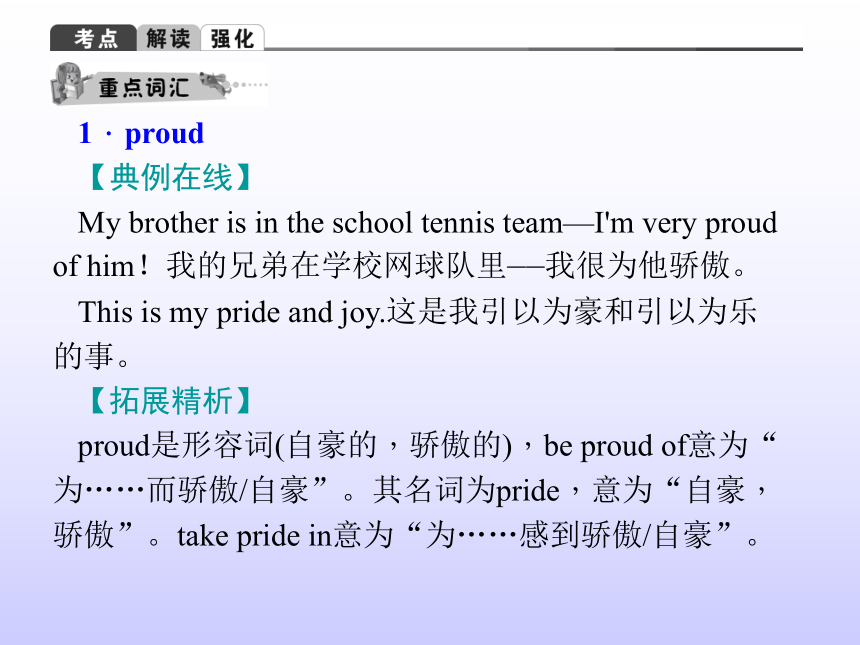
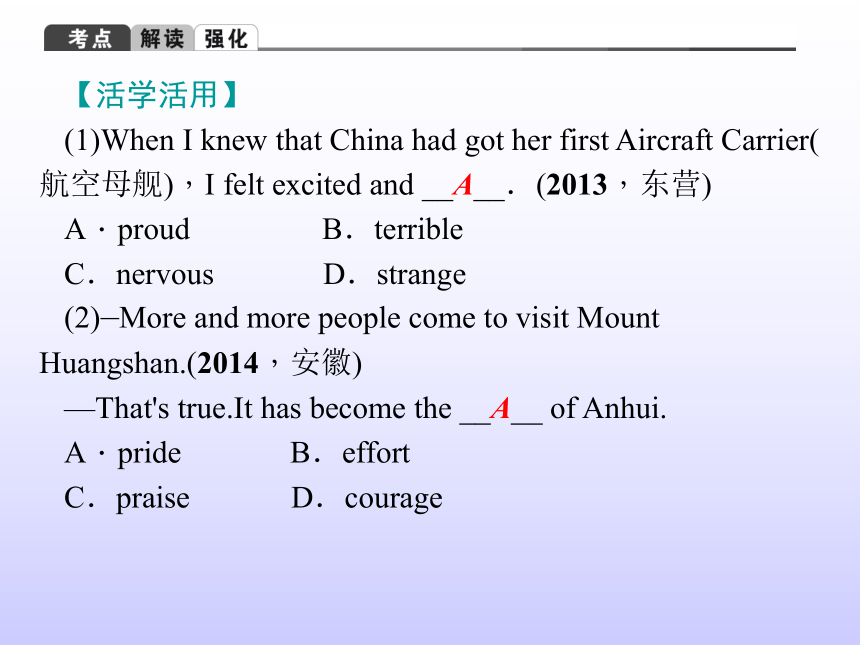
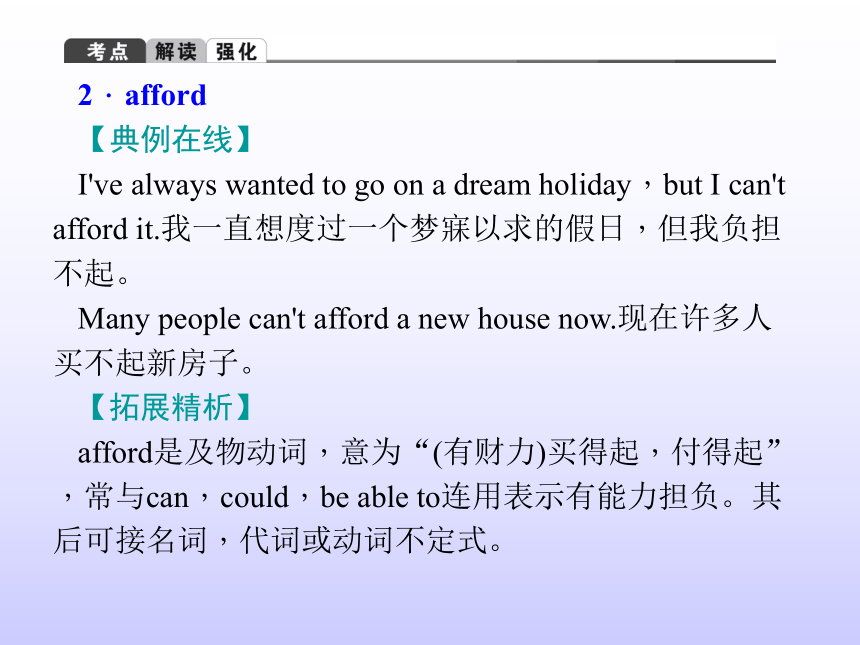
文档简介
课件35张PPT。英 语第12讲
八年级下册 Modules 1~21.smell (v.&n.)smelt(过去式)smelt(过去分词)
2.salt (n.)salty(adj.)咸的
3.proud (adj.)pride(n.)骄傲;自豪
4.strange (adj.)stranger(n.)陌生人
5.hobby (n.)hobbies(复数形式)
6.ever (adv.)never(反义词)
7.enter (v.)entrance(n.)入口8.dream (v.&n.)dreamed/dreamt(过去式)dreamed/dreamt(过去分词)
9.invite (v.)invitation(n.)
10.send (v.)sent(过去式)sent(过去分词)
11.Germany (n.)German(n.&adj.)德国人(的);德语
12.France (n.)French(n.)法语Frenchman(n.)法国人1.have a try 尝一尝,试试看
2.be proud of=take pride in 为……而感到骄傲
3.sb. can't wait 某人等不及了
4.at school 在学校,上学
5.be excited about 对……感到兴奋
6.hear from 收到……的来信
7.win a prize 获奖
8.first prize 一等奖
9.enter a competition 参加比赛10.write about 编写;写作
11.make up 创作
12.count down 倒数;倒计时
13.at the moment 现在
14.work for 效力于……
15.have/has been to 去过某地
16.different from 与……不同
17.so far 到目前为止
18.on the top of 在……的顶上1.What a delicious smell!
好香的味道!
2.It looks lovely,it smells delicious,and it tastes good.
它看起来很令人愉快,闻起来很香,尝起来很好吃。
3.I'm afraid I don't like cheese.
恐怕我不喜欢奶酪。
4.Thanks for your last message.
谢谢你的上一封电子邮件。
5.I can't wait to meet you.
我迫不及待地要见你。6.How do you feel about_ coming to China?
你对来中国感觉怎么样?
7.What do you look like?
你看上去怎么样?
8.—What's your mum like?
你的妈妈怎么样?
—She's friendly.
她很友好。
9.Have you ever won any prizes before?
你以前曾获过奖吗?10.They have been to many interesting places.
他们去过许多有趣的地方。
11.How long have the Robinsons been in Egypt?
罗宾森一家人在埃及待了多长时间?
12.They find it hard/difficult to spell and pronounce the words.
他们发现拼读单词难。
1.proud
【典例在线】
My brother is in the school tennis team—I'm very proud of him!我的兄弟在学校网球队里——我很为他骄傲。
This is my pride and joy.这是我引以为豪和引以为乐的事。
【拓展精析】
proud是形容词(自豪的,骄傲的),be proud of意为“为……而骄傲/自豪”。其名词为pride,意为“自豪,骄傲”。take pride in意为“为……感到骄傲/自豪”。【活学活用】
(1)When I knew that China had got her first Aircraft Carrier(航空母舰),I felt excited and __A__.(2013,东营)
A.proud B.terrible
C.nervous D.strange
(2)—More and more people come to visit Mount Huangshan.(2014,安徽)
—That's true.It has become the __A__ of Anhui.
A.pride B.effort
C.praise D.courage2.afford
【典例在线】
I've always wanted to go on a dream holiday,but I can't afford it.我一直想度过一个梦寐以求的假日,但我负担不起。
Many people can't afford a new house now.现在许多人买不起新房子。
【拓展精析】
afford是及物动词,意为“(有财力)买得起,付得起”,常与can,could,be able to连用表示有能力担负。其后可接名词,代词或动词不定式。【活学活用】
(3)—Some children can't afford __C__ necessary stationary.
—Let's donate our pocket money to them.(2014,扬州)
A.buy B.buying
C.to buy D.be bought3.invite
【典例在线】
I often invite my friends to my home.我经常邀请朋友们来我家。
We invited Mr Black to a meeting.我们邀请布莱克先生参加会议。
【拓展精析】
invite是动词,意为“邀请”,常见用法为:invite sb. to do sth.“邀请某人做某事”;invite sb. to+地点“邀请某人去某地”;invite sb. to+名词“邀请某人去……”。【活学活用】
(4)Lucy is shy.She would not invite her classmates __D__ dancing with her.
A.practise
B.practises
C.practising
D.to practise4.基数词-year-old
【典例在线】
Mr Wang has a two-year-old son.王先生有一个两岁大的儿子。
My best friend is a sixteen-year-old girl.我最好的朋友是一个16岁的女孩。
【拓展精析】
合成形容词的结构为“数词+名词+形容词”形式,其中的名词必须用单数形式;另外也有“数词-名词”结构的合成形容词。合成形容词只能放在名词前作定语,不能作表语。【活学活用】
(5)The park is far away from here indeed.It's about __D__ walk.(2014,苏州)
A.a three hour
B.a three hour's
C.a three-hours
D.a three-hour1.系动词+adj.作表语
【典例在线】
Your pizza looks so nice.你的比萨饼看起来很好吃。
It looks lovely,it smells delicious,and it tastes good.它看起来很令人愉快,闻起来很香,尝起来很好吃。
The cakes taste delicious.这些蛋糕尝起来味道很好。
Silk feels soft and smooth.丝绸摸起来柔软光滑。【拓展精析】
这些句子都是“主语+连系动词+表语”结构。常见的连系动词有:be(是);look(看起来);seem(似乎);appear(显得);feel(觉得,摸起来);get(变得);turn(变得);become(变得,成为);go(变得);sound(听起来);smell(闻起来);taste(尝起来),grow(变得……起来);keep/stay(保持)等。连系动词不能单独作谓语,其后必须接形容词,名词或介词短语作表语。连系动词不能用于被动语态中。【活学活用】
(1)Mom is making dinner.It __A__ so nice!(2014,河北)
A.smells B.tastes
C.feels D.sounds
(2)Coffee is ready.How nice it __A__!(2014,泸州)
A.smells B.sounds
C.feels D.becomes
(3)—Have you heard the song Stay Here Forever?
—Yes.It sounds __C__.(2014,济宁)
A.well B.loudly
C.sweet D.beautiful2.I don't know how to do things in the right way...我不知道如何正确做事……
【典例在线】
I don't know what to do next.我不知道下一步该做什么。
Could you teach me how to make a home page?你能教我如何制作主页吗?
【拓展精析】
how to do things是“疑问词+动词不定式(短语)”结构,它相当于一个名词性从句,通常在某些动词(如tell,know,imagine,learn,decide,forget,remember,consider,understand等)后做宾语,有时也可用作主语、表语、同位语等。【活学活用】
(4)I really don't know what I can do to help her out.(改为简单句)(2014,兰州)
I really don't know what to do to help her out.
(5)我们计划去北京,但还没决定何时去。(2014,广州)
We are planning to go to Beijing,but we haven't decided when to go.3....and they find it hard to spell and pronounce the words.……他们发现拼读单词很难。
【典例在线】
Do you find it easy to have a conversation in English?你觉得用英语交谈容易吗?
I found it boring to play computer games.我发现玩电脑游戏很无聊。
【拓展精析】
find+it+adj.+to do sth.意为“发现做某事……”,此结构中it作形式宾语,真正的宾语是动词不定式短语。类似用法的动词还有think,make,feel等。【活学活用】
(6)Because it was too noisy outside last night,we all found it difficult to_fall(fall) asleep.(2014,荆州)
由于昨晚外面太吵,我们发现很难入睡。
(7)微信使得人们相互交流更加便捷。(2014,烟台)
Wechat makes it more convenient for people to communicate with each other.1.maybe,may be
【典例在线】
Maybe he is not very healthy.可能他不是很健康。
The book may be Peter's.这本书也许是彼得的。
【拓展精析】
maybe是副词,意为“可能”,常位于句首,相当于perhaps。
may be是“情态动词+be”构成的谓语部分,意为“也许是,可能是”。【活学活用】
(1)She __A__ know the answer,but I'm not sure.
A.maybe B.may be
C.may D.must
(2)The kids may be in the library now.(同义句改写)
Maybe the kids are in the library now.2.ago,before
【典例在线】
You can get there before 5:00 pm.你可以在下午5点前到那儿。
He died two years ago.他是两年前去世的。
I've never read such an interesting book before.我以前从未看过这么有趣的书。
【拓展精析】
ago置于“时间段”后,只用于一般过去时,表示从现在算起的一段时间以前。
before置于“时间段”前,可用于一般过去时或过去完成时。before后接“时间点”,可用于任何时态。before也可单独使用,置于句末,一般用现在完成时。【活学活用】
(3)He went to Japan five years__C__.
A.before B.after C.ago D.late
(4)He won't come back__A__nine o'clock.
A.before B.after C.ago D.later
(5)They have ever been there__A__.
A.Before B.after C.ago D.later1.Everything __D__ in our school since 2009.Now,it ________ very modern.(2014,黄石)
A.is changed;is looked B.is changed;looks
C.has changed;is looked D.has changed;looks
2.The skirt __C__ soft as if it is made of silk.(2014,衢州)
A.sounds B.tastes C.feels D.smells
3.—Most of my classmates don't like to talk with their parents,but I am __A__ them.I like to talk to my parents.
A.different from B.afraid of
C.the same as D.proud of4.—__A__ to the United States?
—No,never.But I went to Canada a few years ago.
A.Have you been B.Have you gone
C.Did you go D.Will you go
5.She is a __B__girl with two big eyes.
A.six-years-old B.six-year-old
C.six years old D.six-year-olds
6.—You've never seen dinosaur eggs,have you?
—__B__.How I wish to visit the Dinosaur World!
A.Yes,I have B.No,I haven't
C.Certainly,I have D.Of course,I haven't7.—Is Mr Smith very ill?
—__D__.He's in hospital.
A.I don't think so B.No,he isn't
C.I hope so D.I'm afraid so
8.He has little money now and can't __C__ the beautiful car.
A.take B.buy C.afford D.see
9.—Lily won first prize in yesterday's dancing competition.
—Really?Then her mother must be __D__ her.(2014,襄阳)
A.mad at B.worried about
C.interested in D.proud of
10.—Are you still mad at Lana?(2014,昆明)
—No,it's_water_under_the_bridge.I've forgotten it.__C__
A.这是桥下的水。 B.这是水中的桥。
C.过去的,就让它过去吧。 D.蚂蚁过不去的坎。图表类写作
图表作文就是将表格、数字或图像等所包含的信息,转换成连贯性的文字。
一、图表类写作的注意事项
1.要认真解读图文,切勿疏漏重要数据信息中的细节提示,不必每个数据都涉及,但重要数据必须提到。
2.结论性的表达要从图表信息分析或数据归纳而来,切忌主观判断,更不能主观臆造。
二、经典范文展示
假如你校有几位来自美国的交换生,他们打算周末步行去翠湖公园。请根据提示为他们写出前往的路线,并简介公园情况。要点提示:
1.路线(见下图)2.公园环境优美、凉爽,还可以玩游戏、野餐等;
3.……
Cuihu_Park_is_not_far_from_here.It's_easy_to_get_there.Just_go_straight and turn right at the first corner.Walk along the road and turn left when you find a hospital.
Cuihu Park is down the street on your right.Across from the park is a restaurant.
The park is really a good place to have fun.It's beautiful and cool with many trees and flowers.You can play games or have a picnic there.It's very relaxing.You may also get a good chance to practise Chinese.I hope you will enjoy yourselves.请完成考点跟踪训练12
八年级下册 Modules 1~21.smell (v.&n.)smelt(过去式)smelt(过去分词)
2.salt (n.)salty(adj.)咸的
3.proud (adj.)pride(n.)骄傲;自豪
4.strange (adj.)stranger(n.)陌生人
5.hobby (n.)hobbies(复数形式)
6.ever (adv.)never(反义词)
7.enter (v.)entrance(n.)入口8.dream (v.&n.)dreamed/dreamt(过去式)dreamed/dreamt(过去分词)
9.invite (v.)invitation(n.)
10.send (v.)sent(过去式)sent(过去分词)
11.Germany (n.)German(n.&adj.)德国人(的);德语
12.France (n.)French(n.)法语Frenchman(n.)法国人1.have a try 尝一尝,试试看
2.be proud of=take pride in 为……而感到骄傲
3.sb. can't wait 某人等不及了
4.at school 在学校,上学
5.be excited about 对……感到兴奋
6.hear from 收到……的来信
7.win a prize 获奖
8.first prize 一等奖
9.enter a competition 参加比赛10.write about 编写;写作
11.make up 创作
12.count down 倒数;倒计时
13.at the moment 现在
14.work for 效力于……
15.have/has been to 去过某地
16.different from 与……不同
17.so far 到目前为止
18.on the top of 在……的顶上1.What a delicious smell!
好香的味道!
2.It looks lovely,it smells delicious,and it tastes good.
它看起来很令人愉快,闻起来很香,尝起来很好吃。
3.I'm afraid I don't like cheese.
恐怕我不喜欢奶酪。
4.Thanks for your last message.
谢谢你的上一封电子邮件。
5.I can't wait to meet you.
我迫不及待地要见你。6.How do you feel about_ coming to China?
你对来中国感觉怎么样?
7.What do you look like?
你看上去怎么样?
8.—What's your mum like?
你的妈妈怎么样?
—She's friendly.
她很友好。
9.Have you ever won any prizes before?
你以前曾获过奖吗?10.They have been to many interesting places.
他们去过许多有趣的地方。
11.How long have the Robinsons been in Egypt?
罗宾森一家人在埃及待了多长时间?
12.They find it hard/difficult to spell and pronounce the words.
他们发现拼读单词难。
1.proud
【典例在线】
My brother is in the school tennis team—I'm very proud of him!我的兄弟在学校网球队里——我很为他骄傲。
This is my pride and joy.这是我引以为豪和引以为乐的事。
【拓展精析】
proud是形容词(自豪的,骄傲的),be proud of意为“为……而骄傲/自豪”。其名词为pride,意为“自豪,骄傲”。take pride in意为“为……感到骄傲/自豪”。【活学活用】
(1)When I knew that China had got her first Aircraft Carrier(航空母舰),I felt excited and __A__.(2013,东营)
A.proud B.terrible
C.nervous D.strange
(2)—More and more people come to visit Mount Huangshan.(2014,安徽)
—That's true.It has become the __A__ of Anhui.
A.pride B.effort
C.praise D.courage2.afford
【典例在线】
I've always wanted to go on a dream holiday,but I can't afford it.我一直想度过一个梦寐以求的假日,但我负担不起。
Many people can't afford a new house now.现在许多人买不起新房子。
【拓展精析】
afford是及物动词,意为“(有财力)买得起,付得起”,常与can,could,be able to连用表示有能力担负。其后可接名词,代词或动词不定式。【活学活用】
(3)—Some children can't afford __C__ necessary stationary.
—Let's donate our pocket money to them.(2014,扬州)
A.buy B.buying
C.to buy D.be bought3.invite
【典例在线】
I often invite my friends to my home.我经常邀请朋友们来我家。
We invited Mr Black to a meeting.我们邀请布莱克先生参加会议。
【拓展精析】
invite是动词,意为“邀请”,常见用法为:invite sb. to do sth.“邀请某人做某事”;invite sb. to+地点“邀请某人去某地”;invite sb. to+名词“邀请某人去……”。【活学活用】
(4)Lucy is shy.She would not invite her classmates __D__ dancing with her.
A.practise
B.practises
C.practising
D.to practise4.基数词-year-old
【典例在线】
Mr Wang has a two-year-old son.王先生有一个两岁大的儿子。
My best friend is a sixteen-year-old girl.我最好的朋友是一个16岁的女孩。
【拓展精析】
合成形容词的结构为“数词+名词+形容词”形式,其中的名词必须用单数形式;另外也有“数词-名词”结构的合成形容词。合成形容词只能放在名词前作定语,不能作表语。【活学活用】
(5)The park is far away from here indeed.It's about __D__ walk.(2014,苏州)
A.a three hour
B.a three hour's
C.a three-hours
D.a three-hour1.系动词+adj.作表语
【典例在线】
Your pizza looks so nice.你的比萨饼看起来很好吃。
It looks lovely,it smells delicious,and it tastes good.它看起来很令人愉快,闻起来很香,尝起来很好吃。
The cakes taste delicious.这些蛋糕尝起来味道很好。
Silk feels soft and smooth.丝绸摸起来柔软光滑。【拓展精析】
这些句子都是“主语+连系动词+表语”结构。常见的连系动词有:be(是);look(看起来);seem(似乎);appear(显得);feel(觉得,摸起来);get(变得);turn(变得);become(变得,成为);go(变得);sound(听起来);smell(闻起来);taste(尝起来),grow(变得……起来);keep/stay(保持)等。连系动词不能单独作谓语,其后必须接形容词,名词或介词短语作表语。连系动词不能用于被动语态中。【活学活用】
(1)Mom is making dinner.It __A__ so nice!(2014,河北)
A.smells B.tastes
C.feels D.sounds
(2)Coffee is ready.How nice it __A__!(2014,泸州)
A.smells B.sounds
C.feels D.becomes
(3)—Have you heard the song Stay Here Forever?
—Yes.It sounds __C__.(2014,济宁)
A.well B.loudly
C.sweet D.beautiful2.I don't know how to do things in the right way...我不知道如何正确做事……
【典例在线】
I don't know what to do next.我不知道下一步该做什么。
Could you teach me how to make a home page?你能教我如何制作主页吗?
【拓展精析】
how to do things是“疑问词+动词不定式(短语)”结构,它相当于一个名词性从句,通常在某些动词(如tell,know,imagine,learn,decide,forget,remember,consider,understand等)后做宾语,有时也可用作主语、表语、同位语等。【活学活用】
(4)I really don't know what I can do to help her out.(改为简单句)(2014,兰州)
I really don't know what to do to help her out.
(5)我们计划去北京,但还没决定何时去。(2014,广州)
We are planning to go to Beijing,but we haven't decided when to go.3....and they find it hard to spell and pronounce the words.……他们发现拼读单词很难。
【典例在线】
Do you find it easy to have a conversation in English?你觉得用英语交谈容易吗?
I found it boring to play computer games.我发现玩电脑游戏很无聊。
【拓展精析】
find+it+adj.+to do sth.意为“发现做某事……”,此结构中it作形式宾语,真正的宾语是动词不定式短语。类似用法的动词还有think,make,feel等。【活学活用】
(6)Because it was too noisy outside last night,we all found it difficult to_fall(fall) asleep.(2014,荆州)
由于昨晚外面太吵,我们发现很难入睡。
(7)微信使得人们相互交流更加便捷。(2014,烟台)
Wechat makes it more convenient for people to communicate with each other.1.maybe,may be
【典例在线】
Maybe he is not very healthy.可能他不是很健康。
The book may be Peter's.这本书也许是彼得的。
【拓展精析】
maybe是副词,意为“可能”,常位于句首,相当于perhaps。
may be是“情态动词+be”构成的谓语部分,意为“也许是,可能是”。【活学活用】
(1)She __A__ know the answer,but I'm not sure.
A.maybe B.may be
C.may D.must
(2)The kids may be in the library now.(同义句改写)
Maybe the kids are in the library now.2.ago,before
【典例在线】
You can get there before 5:00 pm.你可以在下午5点前到那儿。
He died two years ago.他是两年前去世的。
I've never read such an interesting book before.我以前从未看过这么有趣的书。
【拓展精析】
ago置于“时间段”后,只用于一般过去时,表示从现在算起的一段时间以前。
before置于“时间段”前,可用于一般过去时或过去完成时。before后接“时间点”,可用于任何时态。before也可单独使用,置于句末,一般用现在完成时。【活学活用】
(3)He went to Japan five years__C__.
A.before B.after C.ago D.late
(4)He won't come back__A__nine o'clock.
A.before B.after C.ago D.later
(5)They have ever been there__A__.
A.Before B.after C.ago D.later1.Everything __D__ in our school since 2009.Now,it ________ very modern.(2014,黄石)
A.is changed;is looked B.is changed;looks
C.has changed;is looked D.has changed;looks
2.The skirt __C__ soft as if it is made of silk.(2014,衢州)
A.sounds B.tastes C.feels D.smells
3.—Most of my classmates don't like to talk with their parents,but I am __A__ them.I like to talk to my parents.
A.different from B.afraid of
C.the same as D.proud of4.—__A__ to the United States?
—No,never.But I went to Canada a few years ago.
A.Have you been B.Have you gone
C.Did you go D.Will you go
5.She is a __B__girl with two big eyes.
A.six-years-old B.six-year-old
C.six years old D.six-year-olds
6.—You've never seen dinosaur eggs,have you?
—__B__.How I wish to visit the Dinosaur World!
A.Yes,I have B.No,I haven't
C.Certainly,I have D.Of course,I haven't7.—Is Mr Smith very ill?
—__D__.He's in hospital.
A.I don't think so B.No,he isn't
C.I hope so D.I'm afraid so
8.He has little money now and can't __C__ the beautiful car.
A.take B.buy C.afford D.see
9.—Lily won first prize in yesterday's dancing competition.
—Really?Then her mother must be __D__ her.(2014,襄阳)
A.mad at B.worried about
C.interested in D.proud of
10.—Are you still mad at Lana?(2014,昆明)
—No,it's_water_under_the_bridge.I've forgotten it.__C__
A.这是桥下的水。 B.这是水中的桥。
C.过去的,就让它过去吧。 D.蚂蚁过不去的坎。图表类写作
图表作文就是将表格、数字或图像等所包含的信息,转换成连贯性的文字。
一、图表类写作的注意事项
1.要认真解读图文,切勿疏漏重要数据信息中的细节提示,不必每个数据都涉及,但重要数据必须提到。
2.结论性的表达要从图表信息分析或数据归纳而来,切忌主观判断,更不能主观臆造。
二、经典范文展示
假如你校有几位来自美国的交换生,他们打算周末步行去翠湖公园。请根据提示为他们写出前往的路线,并简介公园情况。要点提示:
1.路线(见下图)2.公园环境优美、凉爽,还可以玩游戏、野餐等;
3.……
Cuihu_Park_is_not_far_from_here.It's_easy_to_get_there.Just_go_straight and turn right at the first corner.Walk along the road and turn left when you find a hospital.
Cuihu Park is down the street on your right.Across from the park is a restaurant.
The park is really a good place to have fun.It's beautiful and cool with many trees and flowers.You can play games or have a picnic there.It's very relaxing.You may also get a good chance to practise Chinese.I hope you will enjoy yourselves.请完成考点跟踪训练12
